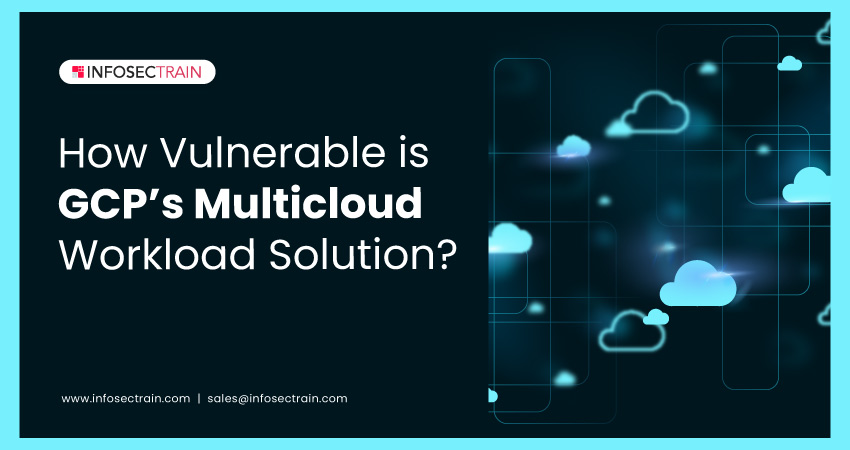How Vulnerable is GCP’s Multicloud Workload Solution?
When integrating with other workloads, sending confidential information, such as passwords or access tokens, over a network or hard-coding them in the software is not recommended. If these secrets are compromised, attackers can use them to gain unauthorized access to systems and data, potentially resulting in significant security breaches. We have already seen examples of major security incidents caused by the theft of credentials from public sources such as GitHub or local machines. This highlights the importance of choosing secure methods to perform authentication and authorization over the internet.

Accessing data outside the cloud environment is often necessary when integrating cloud workloads. Google Cloud Platform (GCP) provides a solution called Workload Identity Federation (WIF) that enables users to access the customer’s data in GCP from external sources through token exchange operations. This eliminates the need to store service account keys insecurely and reduces the risk of unauthorized access to the data. WIF allows secure and seamless access to GCP resources from external sources without storing and managing service account keys or other sensitive information outside of GCP.
What is Cloud Workload Security?
Cloud workload security refers to the technologies, methods, and policies in place to safeguard cloud workloads from possible security risks such as unauthorized access, data breaches, and other cyber threats. It involves securing virtual machines, containers, and other components that comprise cloud-based applications. Cloud workload security ensures that cloud workloads remain secure throughout their lifecycle, from deployment to decommissioning. It typically includes a range of security measures, such as access control, network security, data encryption, and threat detection and response.
What is GCP’s Multicloud Workload Solution?
Google Cloud Platform’s (GCP) Multicloud Workload Solution is a collection of tools and services that help enterprises manage their workloads across multiple cloud environments. With the increasing use of multiple cloud providers, organizations need a solution to efficiently manage their workloads, data, and applications. GCP’s Multicloud Workload Solution provides a unified management platform that enables organizations to deploy and manage their workloads across multiple clouds, including GCP, AWS, and Azure. The solution offers a variety of tools for managing resources, monitoring performance, and optimizing costs across different cloud environments.
One of the solution’s key features is the ability to manage Kubernetes clusters across multiple clouds. Organizations can deploy and manage their containerized applications on any cloud provider without worrying about the underlying infrastructure.
How Vulnerable is GCP’s Multicloud Workload Solution?
Like any cloud-based solution, GCP’s Multi Cloud Workload Solution is also vulnerable to security risks that could compromise data and resources’ confidentiality, integrity, or availability. Some of the specific vulnerabilities that could affect the solution include:
- Misconfiguration: One of the most common causes of cloud security breaches is the misconfiguration of cloud resources. If an organization fails to properly configure access controls, network security, or data encryption, it can leave its GCP’s Multicloud Workload Solution vulnerable to attack.
- Credential theft: If an attacker can steal user credentials or access keys, they could gain unauthorized access to the organization’s GCP’s Multicloud Workload Solution resources. This could allow them to steal sensitive data or launch additional attacks on the organization or other cloud providers.
- Insider threats: Organizations must also be aware of insider threats, where employees or contractors may purposefully or unintentionally jeopardize the GCP’s Multicloud Workload Solution’s security. This could occur through sharing sensitive information or improperly configuring cloud resources.
- Network-based attacks: GCP’s Multicloud Workload Solution may also be vulnerable to network-based attacks such as Distributed Denial of Service (DDoS) attacks, where an attacker floods the network with traffic to overwhelm the system or Man-in-the-Middle (MITM) attacks, where an attacker intercepts and steals confidential information.
How to Mitigate These Vulnerabilities?
To mitigate these and other vulnerabilities, organizations can implement various security measures, including:
- Strong access controls: Implement strong authentication and authorization controls to limit access to GCP’s Multicloud Workload Solution resources only to authorized users and services.
- Regularly patching and updating software: Ensure that all softwares are regularly patched and updated with the latest security fixes.
- Data encryption: Implement strong encryption protocols for data at rest and in transit to protect data from unauthorized access and theft.
- Network security: Implement firewalls, intrusion detection systems, and other network security measures to protect against network-based attacks.
- Regular security assessments: Perform frequent security audits and penetration testing to discover and address vulnerabilities in the GCP’s Multicloud Workload Solution.
Cloud with InfosecTrain
If you are interested in pursuing a career in cloud computing, InfosecTrain offers various training courses that can help you learn the latest skills needed for this field. The courses are designed to provide practical learning opportunities through live, instructor-led classes, interactive lab sessions, and self-guided videos. This approach allows learners to engage in hands-on practice and apply their knowledge. By completing these courses, learners can gain the skills required for a lucrative career in cloud computing.
You can also enroll in our Google Professional Cloud Network Engineer certification training course.







 1800-843-7890 (India)
1800-843-7890 (India)